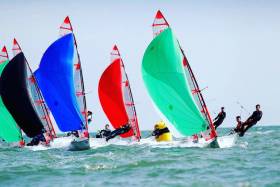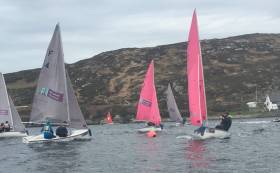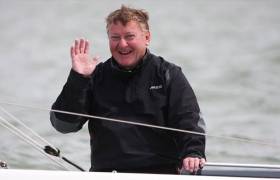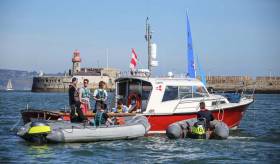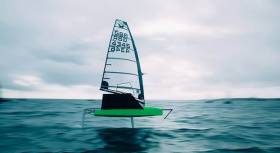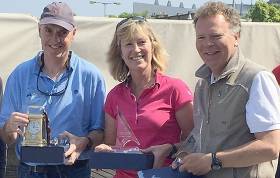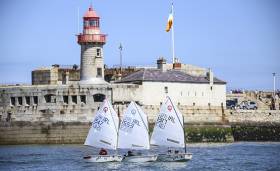Displaying items by tag: Royal St George
New 29er Fleet for Dun Laoghaire? Royal St. George Seeks Interested Youth Sailors for Skiff Venture
The Royal St. George Yacht Club in Dun Laoghaire, County Dublin is seeking youth sailors 'looking for a new challenge'.
RStGYC Sailing Manager Ronan Adams says a group of sailors are looking to form a 29'er fleet in Dun Laoghaire. The RStGYC has put a shout out to to see 'if anyone else might be open to a discussion as to the merits of this double hander class'
While Adams acknowledges 'the 29er is not supported/ recognised by the ISA as a pathway class', he says 'it most certainly does have its merits internationally' and also is a draw as ‘cool’ and fast/ fun boat for the age group mid-teens/ youths who sail it.
The Royal St. George's Tom Higgins has launched a new 29er campaign with Royal Cork's Harry Durcan as Afloat.ie reported previously.
One possible draw back is that the learning curve is very steep, vertical nearly but those that stick with it will be rewarded. Good second hand boats are in the region of €5k and are available in the UK, according to Adams.
RStGYC currently has two interested families and at least one in another waterfront Club in Dun Laoghaire who would like to meet other interested parties to discuss.
Expressions of interest or suggestions on whom to pass on the information are encouraged. The plan is to put all interested parties in touch with one another through email and see what happens.
email: [email protected] who are aiming to hold a meeting on Sept 10th or 17th. and have your say on Afloat's Facebook page. Here's what others have been saying:
Team Racing Clinic At Royal St George YC Next Week
#TeamRacing - The Royal St George Yacht Club next week hosts a clinic in team racing — which is quickly gaining a reputation as Ireland’s most enjoyable and fastest growing type of sailing for teenagers.
Running from Monday 14 to Thursday 17 August, and with some of Ireland’s top youth team racers as coaches, The Royal St George says the clinic promises to be a great week.
The team racing clinic is open to sailors of all experience levels, aged between 13 to 18 years, and will be sailed in the club’s team racing Firefly dinghies.
The cost is €120 for members (€150 for non-members) which includes coaching, use of the club boats and lunch daily. Single days’ coaching is also available for €30 (€37.50 for non-members).
Places have been filling up quickly so act fast of you want to take part. Click HERE for more details.
Race Win For Royal St. George's Byrne Moves Irish Dragon Back up Edinburgh Cup Leaderboard
The penultimate day of the Dragon Edinburgh Cup 2017, produced one truly extraordinary race which shook the leader board up and leaves four boats in close contention going into the final race. Ireland's Martin Byrne from the Royal St. George Yacht Club of Dun Laoghaire has moved back up the leaderboard in the 38–boat fleet to seventh overall after a well–earned victory in race five. Download overall results below.
As they set off for the race area, the competitors found that the forecast north-westerly was instead an extremely shifty south-easterly of around 10-12 knots. Even seasoned locals famed for their ability to read the Solent's vagaries with ease have found themselves struggling to make sense of the apparently random shifts this week and today was no different. Recently crowned Dragon World Champion and Solent local Andy Beadsworth summed the situation up with a wry smile saying, "It's a little bit harder to win here that it was [at the Worlds] in Cascais! It's home waters and I thought I knew what was going on in the Solent, so I thought I knew how to go the right way, but we're getting it wrong with monotonous regularity."
Beadsworth, sailing TUR1212 Provezza Dragon with Simon Fry and Ali Tezdiker, had had a disastrous race four and went into the day in fourth place on 31 points. Ahead of him were Igor Goikhberg in RUS98 Murka with Dmitry Berezkin and Roman Sadchikov in third on 26 points, Poul Richard Hoj-Jenson in GBR813 Danish Blue with Paul Blowers and Hamish McKay on 21 points and Martin Payne in GBR585 Full Speed with Gillian Hamilton and Chris Britten leading on 16 points.
With seconds to go, Beadsworth shot clear of the pack, which was holding back for fear of being pushed over the line by the tide, midline and was able to tack onto port and port tack most of the right side of the fleet. It was almost impossible to keep up with who was leading, as the big shifts pushed boats down snakes and up ladders constantly. At one point Payne looked good on the left, but he ended up virtually last around the weather mark. Meanwhile, Martin Byrne and his team of Pedro Andrade and Conor Byrne in IRL216 Jaguar had done the best job of picking their way through the minefield to lead Graham Bailey, sailing GBR782 Aimee with Julia Bailey, Will Heritage and Will Bedford, off down the first run, with Goikhberg a very close third. Beadsworth and Hoj-Jensen both rounded just inside the top ten.
From here on in Byrne kept clear air and extended his lead, but Bailey had his work cut out to keep the pack at bay as Beadsworth and Hoj-Jensen dug deep to fight their way to the front. As the boats closed the line at the end of the third and final beat, Byrne took a comfortable victory from Bailey with Tom Vernon in GBR810 Badger crewed by Oliver Spensley-Corfield and Adam Bowers third. Beadsworth had made his way up to fourth, Dmitry Bondarenko in Hauschreckeand with Vadim Statsenko and Alexander Shalagin was fifth, Hoj-Jensen sixth and Goikhberg seventh, but Payne unable to do better than 20th, which he immediately discarded.
So the showdown in tomorrow's remaining race is going to be a humdinger. Bailey tops the leader board with 12 points, Hoj-Jensen is on 14, Beadsworth 15 and Payne 16. The forecast for that final race is 12 gusting 20 knots from the north-west, but we're beginning to learn that what is forecast and what we get are not necessarily related this week so stand by and watch this space.
After sailing the crews once again repaired to the Island Sailing Club's terrace where the daily prize giving included the presentation of the Crews Race Trophy, which went to Nigel Cole sailing Avalanche, and the Youngest Sailor Trophy which went to Will Heritage of Aimee. The prize giving was followed by the final special raffle draw of the event. Over £30,000 of prizes have been given away in the draw, for which all boats are eligible, and the top prize of a Petticrows Dragon radio model yacht was drawn tonight. One of the rules of the draw is that if the winning person is not present to collect their prize then they miss their turn and another ticket is drawn. Tim Tavinor of Petticrows assisted Regatta Chairman Gavia Wilkinson-Cox by drawing the winning ticket, but the name read out elicited no response and so Tim went in for a second ticket. As he read out the name Furious a huge cheer went up and owner Owen Pay was for once completely lost for words and clearly absolutely delighted with his new toy.
Today's final race is programmed to get underway at 11.00 and the regatta will conclude with the Edinburgh Cup 2017 Prize Giving Dinner Dance at the Royal Corinthian Yacht Club.
Although the Royal St. George Yacht Club officially welcomes its new Committee boat ‘Pegasus’ to Dun Laoghaire Harbour today, the new vessel has already started its 2017 work, pictured above, on station yesterday at the Leinster School's Team Racing Championships.
The new acquisition will be the 'hub' for many of the sailing activities at the Dun Laoghaire club.
Howth Yacht Club's Kissane In Top Half of UK Moth Fleet
Alistair Kissane of Howth Yacht Club has finished in the top half of the UK's Moth Championships sailed at Portland Harbour. Kissane, who finished 34th, was one of two Irish in the 73–boat fleet. Royal St. George's Jim Devlin was 52nd. Results are here.
The wind just didn't play ball on the final day, with the odd gust reaching 7 knots across Portland Harbour, but more commonly 3-4 knots and much less. At 1pm the race team called time and raised AP over A to abandon racing for the day. This means the results at the end of Monday stand and Robert Greenhalgh has been crowned the UK International Moth class champion for 2016.
At the prize giving Robert thanked the Race Team, all the staff at the WPNSA, the UK Moth Class Association for putting all the work in ahead of the event and the sponsors; VRsport.tv, blueteq, Brand Identity, Ronstan and Noble Marine.
The podium was completed by David Hivey in second and Dylan Fletcher in third.
The next major event for the International Moth Class is the MS Amlin Moth Regatta in Bermuda from 2-9 December. In 2017 the World Championships are being held in Malcesine on Lake Garda from 23-29 July.
Final top five
1. Robert Greenhalgh, GBR, 8.0
2. David Hivey, GBR, 12.0
3. Dylan Fletcher, GBR, 18.0
4. Mike Lennon, GBR, 31.0
5. Jason Belben, GBR, 32.0
Royal St George Dragons "Phantom" & 'Jaguar Sailing Team' shared equal points well ahead at the top of the leader board at this weekend's Dragon East Coast Championships hosted by the Royal Irish Yacht Club.
Phantom helmed by Neil Hegarty took the overall title by virtue of their accumulation of three first place finishes. Martin Byrne & Adam Winkelmann's Jaguar scored all their results in the top three to finish second overall.
Richard Goodbody on "Diva" from the RIYC won the final race to take 3rd overall.
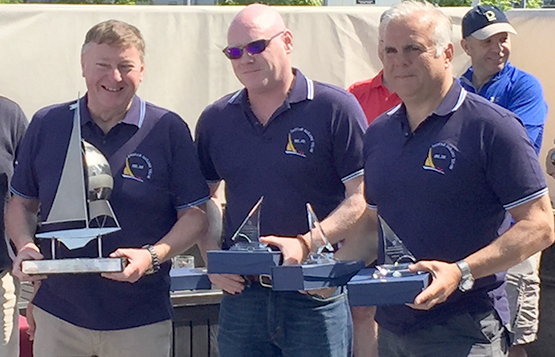
Martin Byrne, Donal Small and Adam Winkelmann'sailing Dragon Jaguar were second overall
A combined fleet of 148 Optimist dinghies racing in Senior, Junior and Regatta fleets competed for Leinster Championships honours at the Royal St. George Yacht Club at the weekend. Senior honours in a 48–boat fleet went to 15–year–old Harry Bell of Howth Yacht Club who was four points clear of Micheal O'Suilleabhain of Kinsale Yacht Club. Third was Alfonso Moreno Perez of Royal Cork Yacht Club. Six races were sailed with one discard. In the junior fleet, 12–year–old Michael Crosbie of Royal Cork Yacht Club was the winner in the 43–boat fleet. Local sailor Jessica Riordan of the host club was the regatta winner in her 41–boat fleet.
Royal St George Seeks Office Administrator
#Jobs - The Royal St George Yacht Club is seeking an experienced office administrator.
The role is a permanent position with a requirement for some weekend and evening hours.
The ideal candidate for the job will possess:
• Excellent personal presentation and communication skills.
• Exceptional people skills and a great phone manner.
• First rate computer skills (Microsoft Excel, Outlook, PowerPoint, Word).
• Experience of diary management and scheduling.
• Ability to work under pressure and meet deadlines.
• Attention to detail.
• The ability to multitask and take on extra responsibility if needed.
Candidates must have fluent English and at least two-plus years’ experience in office administration and associated references.
If interested, please send your CV and covering letter in PDF format to [email protected]
A unique gathering of Irish Fireballers drawn from five decades brought back memories of a golden age for dinghies when over 200 sailors met at a refurbished Royal St. George Yacht Club last Saturday night in Dun Laoghaire. The evening drew together Fireball interests from all four coasts with plenty of old teams making the trip to Dun Laoghaire for the special event to mark fifty years since the plywood dinghy first arrived in Ireland.
A Pimms reception kicked off proceedings before a number of speakers recounted stories through five decades of Irish Fireballing that included Fireball world champion John Lavery who took the title in 1995.
Irish Sailing Association President and past Fireball national champion David Lovegrove from Howth gave his take on the two man dinghy class and there was also a big cheer for class pioneer Roy Dickson of Howth Yacht Club.
A trawl of the class archives produced an array of early class photographs dating back to the exciting days of the 1977 World Championships in Kinsale. Early photographs, magazines, memorabilia and cine reel footage depicted the Irish class when fleet numbers touched 70 boats went on display throughout the club documenting one of the biggest ever Irish dinghy classes.
In order that crews could circulate over the course of the evening the team of former Fireballers who organised the evening decided against a sit down dinner and instead planned a stand up buffet evening with pod tables using the entire top level of the clubhouse.
As well as past sailors there was a healthy representation of current crews including Irish champions Barry McCartin and Conor Kinsella also from the host club. Class Chair Marie Barry spoke about current class plans.
A Royal Cork Yacht Club contingent included Anthony and Sally O'Leary and Clayton Love minor. Munster representation inlcuded a presentation from Baltimore's Stuart Musgrave.
From the north, Adrian and Maeve Bell from Lough Neagh, who dominated the class in the 1980s also made the trip.
The reunion organisers were Derek Jago, Paul Maguire, Brian Craig and Ciara Dowling who can be contacted by email: [email protected]
Royal St George Yacht Club Seeks 2016 Sailing Instructors
The Royal St George Yacht Club in Dun Laoghaire is to recruit a team of committed sailing instructors and coaches for its 2016 Summer programmes on Dublin Bay.
The open positions required for instructors are:
Senior Instructor x 1
Kites and Wires x 1
Racing Instructor: x 1
Adventure Instructor x 1
Dinghy Instructors x 5
Squirts/Tigers x 2
Some Assistant Instructors
Job Descriptions Dinghy Instructor
Enthusiastic, and highly motivational staff, to teach the basic of sailing to our very youngest members. Staff must have a working knowledge of the ISA Syllabus up to Improving Skills, and a level of personal proficiency far above this. Applicants will be working with sailors from the ages of 8 and must be capable of working with individuals at this age and embrace the challenge.
Advanced Instructor: (Kites and Wires, Adventure and Advanced Boat Handling)
Excellent level of personal skill and attainment required, as well as a true passion for the sport. The ideal candidate will be able to facilitate the development of skilled, independent sailors and work closely with the Senior Instructors and Head Coach in identifying talent in both the Racing and Cruising areas of sailing.
Race Coach
Must have the ability to create a team atmosphere and mentality conducive to a progressive, constructive environment. The Coach must have excellent technical knowledge of the boats in question and an intimate knowledge of coaching techniques and development. He/ She will work extremely closely with the Head Coach in helping to develop the Race Team programs within the club and must be open to travel within Ireland for events and training.
To apply for these jobs click here


























